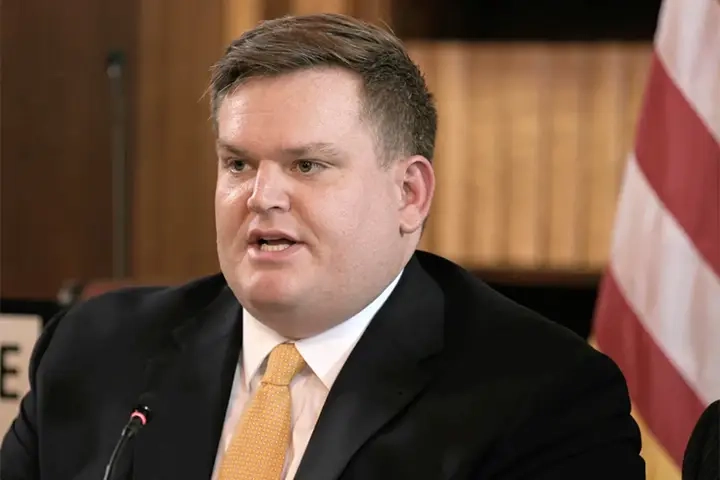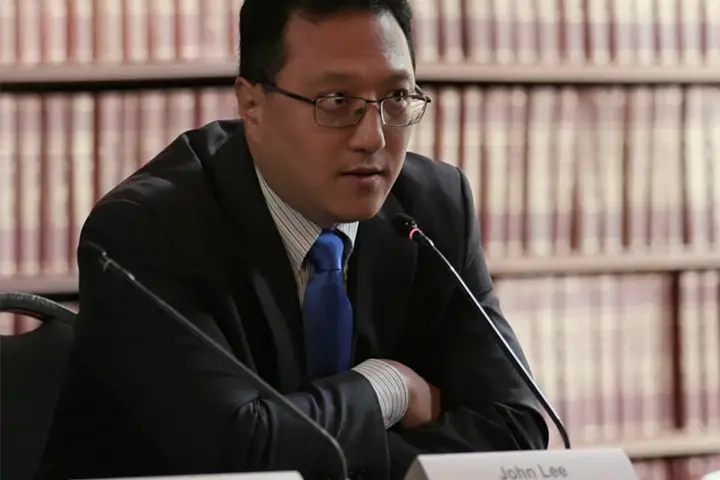There was one thing everyone agreed on at Monday's listening session on lowering the cost of prescription drugs: Something must be done to rein in pharmacy benefit managers (PBMs).
Problems in the prescription drug marketplace such as lack of transparency "are compounded by the labyrinth of regulations and a web of intermediaries," including PBMs, Thomas DeMatteo, chief counsel to Sen. Mike Lee (R-Utah) on the Senate Judiciary Committee, said at the listening session, which was hosted by the Federal Trade Commission (FTC) and the departments of Justice, Commerce, and HHS. "Insurance companies, PBMs, drug wholesalers, and pharmacies are all taking a cut at various stages of the supply chain. The result is a system where patients understandably feel as if everyone has their hand in their pocket when it's functioning as intended."
"PBMs serve an essential role by aggregating purchasing power across millions of covered lives," he continued. "They can negotiate substantial rebates and discounts from drug manufacturers that individual insurers or pharmacies alone could not obtain ... but they also risk becoming your toll collectors on the supply chain. PBMs' compensation structures can, at times, create perverse incentives. One notable example is the so-called 'rebate trap,' where low-cost generics may be less attractive to PBMs because they generate minimal rebate revenue. Consequently, PBMs may steer patients towards higher-priced branded drugs that provide greater rebates even when equally effective, lower-cost generics are available."
 The way PBMs are paid can create "perverse incentives," said Thomas DeMatteo, chief counsel to Sen. Mike Lee (R-Utah) of the Senate Judiciary Committee.
The way PBMs are paid can create "perverse incentives," said Thomas DeMatteo, chief counsel to Sen. Mike Lee (R-Utah) of the Senate Judiciary Committee. Nicholas Pottebaum, adviser to Senate Judiciary Committee chair Sen. Chuck Grassley (R-Iowa), noted that PBMs are "steering more patients away from their local pharmacy through low-reimbursement mail order requirements, as well as limiting patient choice." This also comes at a time when "the three major PBMs control roughly 80% of the PBM market, and many are vertically integrated with insurance companies, providers, specialty and mail pharmacies, group purchasing organizations, offshore rebate aggregators, and more," he added.
With nearly half of U.S. health spending coming from the federal, state, and local government, "as policymakers, we need to be asking the question: Are we getting the best, most efficient deal at the cheapest price for prescription drugs?" Pottebaum said. "Higher patient costs, reduced access, reduced competition, and greater consolidation suggest we are not." He noted that Grassley had introduced the PBM Transparency Actopens in a new tab or window , a bipartisan bill "which directs the FTC to stop deceptive and unfair pricing schemes like spread pricing, prohibits arbitrary clawbacks of payments made to pharmacies, and requires PBMs to report to the FTC how much money they're making through spread pricing and pharmacy fees."
But on other issues, the panel -- which included staff members for House and Senate Republicans but no one on the Democratic side -- didn't always agree. Peter Stein, senior policy adviser to Rep. Diana Harshbarger, PharmD (R-Tenn.), a member of the House Energy & Commerce Committee, discussed the Medication Affordability and Patent Integrity Actopens in a new tab or window that Harshbarger is co-sponsoring with Sen. Maggie Hassan (D-N.H.). Currently, "brand-name manufacturers can ... game the drug approval and patent system by telling one story to the FDA about their new drug, and telling another story to the PTO [Patent and Trademark Office]," Stein said.
"Although the FDA and the PTO receive the [same] basic information about a drug's chemistry and manufacturing, manufacturers can exploit the lack of coordination between FDA and PTO and hold back information from PTO so they can seek secondary patents years later," he continued. "This can lead to 'patent thickets' that unfairly extend the product's market exclusivity, blocking biosimilar and other generic drugs from market entry years after an initial product's patent has expired." The legislation requires manufacturers to certify that when they submit initial information to the FDA and the PTO, they are not knowingly submitting conflicting or incomplete information. "Failure to comply with this act ... could render a patent unenforceable," he added.
But Peter-Anthony Pappas, director of intellectual property policy for Sen. Thom Tillis (R-N.C.) of the Senate Judiciary Committee, dismissed the idea that patent thickets were an issue at all. "Earlier this year, the PTO presented [an] analysisopens in a new tab or window that showed that large patent families that many claim amount to so-called 'patent thickets' may be an issue in other fields, but they're not actually common in the pharmaceutical industry," he said.
"In addition to these troubling inaccuracies, those who target the patent system as a means to lower drug prices often disregard the careful balance" in the system, which tries to prevent unfair use of patents while at the same time incentivizing pharmaceutical innovation, Pappas added. "It is critical to keep these incentives in focus as that is what brings new and improved medicines to patients in the first place."
 The patent system is not working well for pharmaceuticals, said John Lee, chief counsel for intellectual property at the House Judiciary Committee.
The patent system is not working well for pharmaceuticals, said John Lee, chief counsel for intellectual property at the House Judiciary Committee. Panelist John Lee, chief counsel for intellectual property on the House Judiciary Committee, called for a good balance of all the competing issues. "I think there's a lot of rhetoric going one way, going the other way, and I think really the truth is somewhere in between," he said. "It is absolutely true that a critical part of the health of Americans is the availability of cutting-edge medicines. And in order to get cutting-edge medicines, we need to have a healthy innovation ecosystem, of which the patent system is an important part ... But at the same time, I think all of us can see that the balance and the status quo is not working."
The Judiciary Committee is looking at a variety of bills to address the problems, including measures aimed at addressing patent thickets and at improving the way courts handle patent disputes, Lee said. The committee is also looking at "skinny labeling," in which generic companies seek to patent their version of a particular branded drug that has multiple uses, but they only seek a patent for the uses of that drug that are coming off patent, allowing the generic to get to market more quickly.



